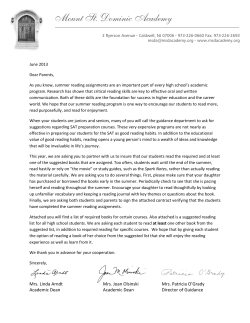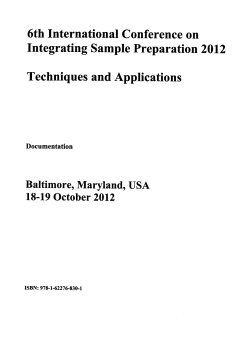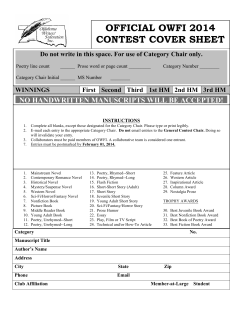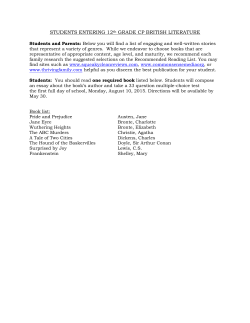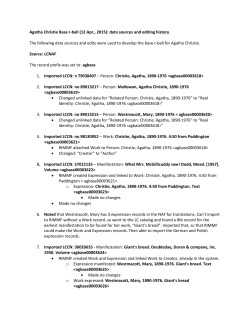
Recommended books
THE BIBLIOMANIACS’ LIST OF RECOMMENDED READS We have divided the books into sections by year group. This is a recommendation only. If you want to read any book on the list you can, of course, try it at any time. All the books are available in the school library except those few in italics which can, of course, be borrowed or bought elsewhere. We recommend you try to read at least three of these books per term in addition to any of the authors you are already enjoying. You should keep a READING DIARY with your thoughts on each book, particularly any aspects of the style of writing or characterisation you really admire. There will be a very generous prize (in book tokens) for CHAMPION READER in each year group at the end of the year. This will be judged by Messrs. Cooper, Auld and Malan. The champions will be chosen on the basis of an inspection of their reading diary and an interview with the judges. Year 6 Lloyd Alexander, The Chronicles of Prydain (5 marvellous fantasy novels set in a mythical Wales) J.M.Barrie, Peter Pan (a well-known story from other media but worth a read of the original) Frances Hodgson Burnett, The Secret Garden (a spiky female heroine and a house and garden with a secret) Lewis Carroll, Alice’s Adventures in Wonderland (weird, wacky and very, very clever) Anthony Buckeridge, Thanks to Jennings (one of a very funny series of school stories) J.Meade Falkner, Moonfleet (a smuggling tale with a particularly memorable first scene) Charles Dickens, A Christmas Carol (a great introduction to the great novelist) Sir Arthur Conan Doyle, The Adventures of Sherlock Holmes (now is the time to meet the great detective) Neil Gaiman, Coraline (a contemporary dark fairy tale) Kenneth Grahame, The Wind in the Willows (classic characters and an elegiac tone) Anthony Horowitz-Alex Rider series Eric Kastner, Emil and the Detectives P.B Kerr, Children of the Lamp series (fun fantasy novels from a writer best known for his adult thrillers) Rudyard Kipling, Just So Stories C.Day Lewis, The Otterbury Incident (a 1940s children’s gang book by a future poet laureate) T.H White, The Sword in the Stone (King Arthur as a boy) Mark Twain, The Adventures of Huckleberry Finn (folksy and fun) Year 7 John Buchan, The Thirty nine steps (a classic adventure novel; then watch Alfred Hitchcock’s film version that has little to do with the book!) John Buchan, John Macnab (Mr Cooper’s favourite book, a tale of poaching in Scotland written in the style of the most gripping thriller) Agatha Christie, Murder on the Orient Express (read it before the Christmas TV version is shown) Agatha Christie, A Murder is Announced (deceptively cosy, contains probably her most vivid murder and a particularly clever solution) Agatha Christie, And then there were none (terrifying, terrifying) Agatha Christie, The murder of Roger Ackroyd (read it in one session and be amazed) Roald Dahl, Tales of the Unexpected (Dahl at his darkest) Philip.K.Dick, Minority Report (futuristic yet worryingly plausible) Charles Dickens, The Pickwick Papers (his first novel, very episodic – so you can dip in and out – but light and fun) Charles Dickens, David Copperfield (great characters and a partly autobiographical tale with which it is easy to identify) Jack London, The Call of the Wild (classic nature adventure) John Masefield, The Box of Delights (a fantasy from another poet laureate) John Boyne, The Boy in the Striped Pyjamas (a modern novel about a distressing subject made palatable by the sympathetic child characters) R.L.Stevenson, Treasure Island (the greatest adventure of them all) R.L.Stevenson, Kidnapped Year 8 Jane Austen, Pride and Prejudice (often declared the greatest novel ever: find out why) Jane Austen, Emma (some people prefer this more acerbic story with its tricksy heroine) Charlotte Bronte, Jane Eyre (great Gothic novel) Geoffrey Chaucer, [General Prologue to] The Canterbury Tales (middle English narrative verse, look at a translation but try to track down the original too) Homer, The Iliad (read particularly books (chapters) 1, 9, 16, 21, 22 and 24) Homer, The Odyssey (read particularly books (chapters) 9-12 and 24) G.K. Chesterton, Father Brown (a priest detective) G.K. Chesterton, The Man who was Thursday (brilliant “nightmare” which will dazzle and confuse) Ian Fleming, On her Majesty’s Secret Service (Bond, James Bond: brutal and ultimately moving; really, any Bond will give you the flavour) Thomas Hardy, Far from the Madding Crowd (his most accessible and upbeat Wessex novel) Jack Higgins, The Eagle has landed (thriller about a Nazi plot to assassinate Churchill) Dorothy. L. Sayers, Murder Must Advertise John Steinbeck, Of Mice and Men (an American fable) Jonathan Stroud, The Bartimaus Trilogy (very modern, lots of fun) J.R.R Tolkien, The Lord of the Rings (just read it) Jules Verne, 20,000 Leagues under the Sea (a nautical fantasy) Jules Verne, Journey to the Centre of the Earth (magnificent) Daniel Defoe, Robinson Crusoe (one of the first novels and a great adventure yarn) John Wyndham, Jizzle (fiendishly clever short stories) P. G. Wodehouse (anything: all brilliant) David Eddings, The Belgariad (a fabulous five-part fantasy series. Mr Cooper has recently finished reading it for a third time!)
© Copyright 2025

